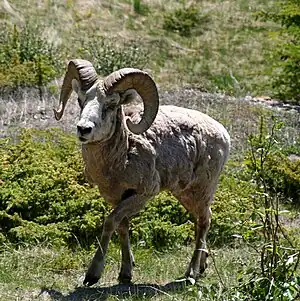< Reconstruction:Proto-Slavic
Reconstruction:Proto-Slavic/ovьnъ
Proto-Slavic
Etymology
Inherited from Proto-Balto-Slavic *awinas. By surface analysis, *ovь (“sheep”) + *-ьnъ.
Inflection
Declension of *ovь̀nъ (hard o-stem, accent paradigm b)
| singular | dual | plural | |
|---|---|---|---|
| nominative | *ovь̀nъ | *ovьnà | *ovьnì |
| genitive | *ovьnà | *ovьnù | *ovь̀nъ |
| dative | *ovьnù | *ovьnòma | *ovьnòmъ |
| accusative | *ovь̀nъ | *ovьnà | *ovьnỳ |
| instrumental | *ovьnъ̀mь, *ovьnòmь* | *ovьnòma | *ovь̀ny |
| locative | *ovьně̀ | *ovьnù | *ovь̀něxъ |
| vocative | *ovьne | *ovьnà | *ovьnì |
* -ъmь in North Slavic, -omь in South Slavic.
Related terms
- *ovьca (“sheep (female)”)
Descendants
- East Slavic:
- Old East Slavic: овьнъ (ovĭnŭ), овенъ (ovenŭ)
- Russian: ове́н (ovén)
- Old East Slavic: овьнъ (ovĭnŭ), овенъ (ovenŭ)
- South Slavic:
- West Slavic:
References
- Derksen, Rick (2008) “*ovьnъ”, in Etymological Dictionary of the Slavic Inherited Lexicon (Leiden Indo-European Etymological Dictionary Series; 4), Leiden, Boston: Brill, →ISBN, →ISSN, page 384
- Zhuravlyov, A. F., editor (2014), “*ovьnъ”, in Этимологический словарь славянских языков [Etymological dictionary of Slavic languages] (in Russian), numbers 39 (*otъtęti – *ozgǫba), Moscow: Nauka, →ISBN, page 222
This article is issued from Wiktionary. The text is licensed under Creative Commons - Attribution - Sharealike. Additional terms may apply for the media files.
